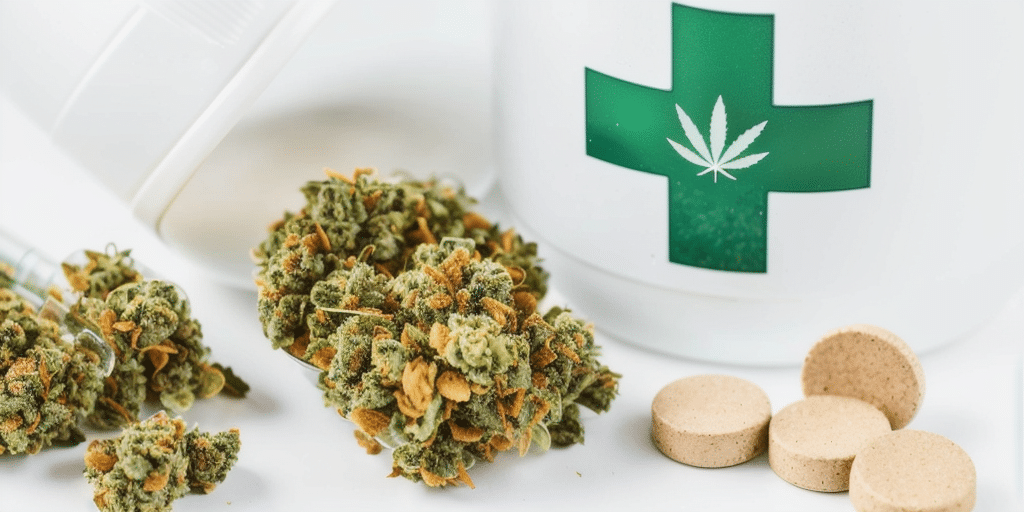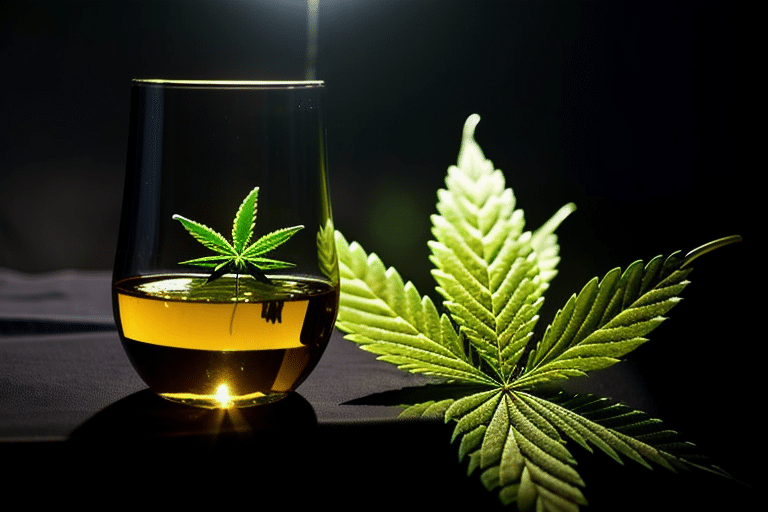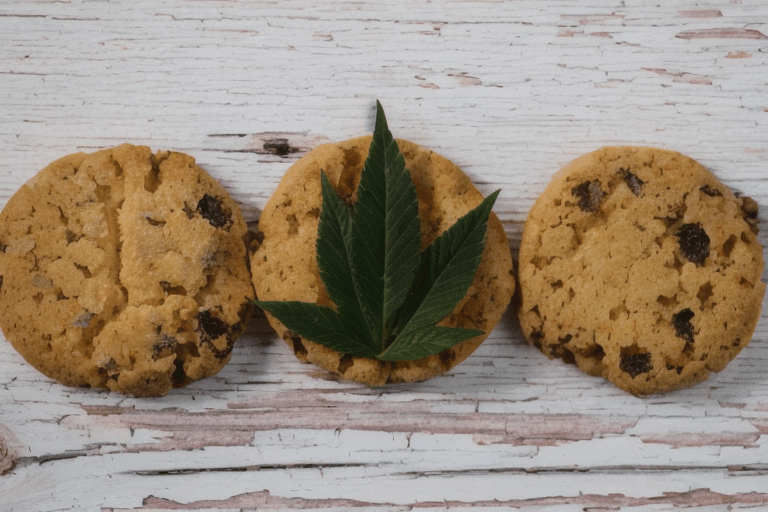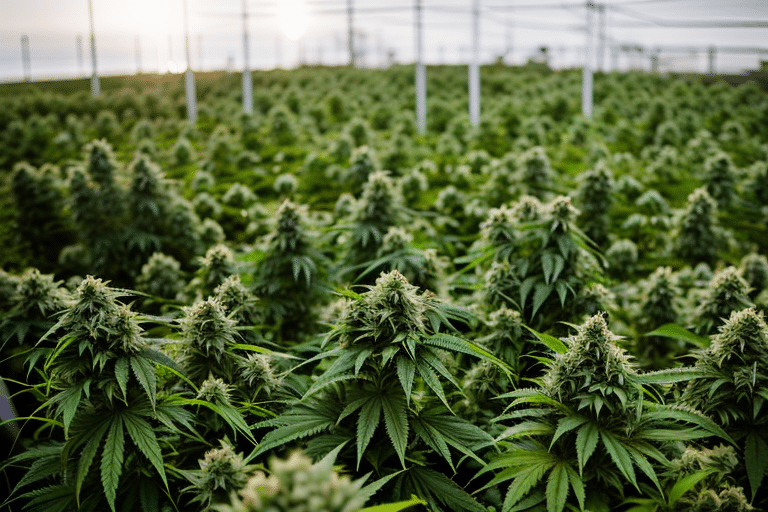Delta-9 Acetate, or THC-O-acetate, is a potent derivative of THC that offers an intensified experience compared to traditional THC, with effects ranging from calm relaxation to intense psychedelic experiences.
The potential risks and benefits of using Delta-9 THC-O-acetate include its heightened potency and unique effects, but also possible adverse reactions, toxic ketene gas formation when heated, and legal concerns; consumers can navigate this enigmatic cannabinoid safely by prioritizing quality and safety, selecting reputable manufacturers that provide transparent lab testing results, and starting with modest doses while gradually increasing as needed.
Table of Contents
ToggleThe Enigma of Delta-9 Acetate (THC-O-Acetate)
Delta-9 Acetate (THC-O-Acetate) is a new compound on the market that is creating quite a buzz and for good reason. It’s highly psychoactive and somewhat unregulated. It’s best to get as informed as possible before making products with or experimenting with this exciting substance.
Unraveling the Potency of a THC Derivative
Imagine a world where we take something familiar and, through a stroke of scientific ingenuity, transform it into something far more powerful. This is precisely the case with Delta-9 Acetate—also known as THC-O-acetate—a potent derivative of the renowned cannabinoid THC (tetrahydrocannabinol). In recent years, this compound has captured the attention of cannabis enthusiasts due to its intensity, which is said to surpass that of regular THC by leaps and bounds. This enigmatic cannabinoid has piqued the curiosity of many seeking to explore its distinctive effects.
A New Era: The Emergence of Hemp-Derived Compounds
As our understanding of cannabinoids expands, so too does our experimentation with various hemp-derived substances. Scientists and researchers have delved into this realm, uncovering novel compounds that offer a spectrum of effects—from gentle relaxation to profound psychedelic experiences. Delta-9 Acetate has risen from these scientific endeavors as an alternative for individuals in search of an experience more potent than what traditional THC products can provide.
The Alchemy of Delta-9 Acetate: A Journey into Synthetic Cannabinoids
Synthetic cannabinoids like Delta-9 THC-O-acetate are created through chemical reactions involving natural THC compounds, and while they can be more potent than their natural counterparts, their legality remains contentious and their effects on humans are uncertain due to a lack of regulation and standardization.
The Emergence of Synthetic Cannabinoids
In the ever-evolving world of cannabis, the 2018 Farm Bill marked a turning point for the industry. By reclassifying hemp, distinguished by containing less than 0.3% THC, as a legal product in the US, it paved the way for new and intriguing possibilities. Among these are synthetic cannabinoids like Delta-9 THC-O-acetate – lab-created compounds that mimic the effects of their natural counterparts.
Crafting Delta-9 THC-O-Acetate: A Chemical Ballet
Unlike its sibling Delta-9-THC, which is found naturally in cannabis plants, Delta-9 THC-O-acetate must be synthesized through a delicate chemical reaction involving either Delta-9 or Delta-8 THC. The outcome? A dark and viscous liquid residue that appeals to those seeking a potent psychoactive experience. Often sold as a vaping product or incorporated into edible treats like gummies, this enigmatic compound has captured the imagination of many.
Unraveling the Mystery: Comparing Delta-9o, THC-O, and HHC-O
Delta-9 THC-O-acetate has been dubbed the “spiritual cannabinoid” for its purported psychedelic properties – some sources even claim it’s 2-3 times stronger than regular THC.1 This air of mystique can be traced back to clandestine experiments conducted by the United States government from 1950 to 1975 at Maryland’s Edgewood Arsenal facility. Here, human soldiers were subjected to tests involving hallucinogenic drugs, nerve gases and other chemicals – including, possibly, synthetic cannabis analogs like Delta-9 THC-O-acetate. However, this chapter remains shrouded in secrecy as the results have never been disclosed to the public.
While animal studies suggest that Delta-9 THC-O-acetate is roughly twice as potent as THC, the lack of regulation and standardization in the US renders human dosing uncertain. As such, caution is advised when using products containing this compound, as undesirable side effects like confusion, excessive drowsiness and hallucinations may arise.
The legal landscape surrounding hemp-derived Delta-9 THC-O-acetate remains contentious on a federal level. As more states grapple with the implications of these psychoactive cannabis-derived products, it’s likely that restrictions on their sale and use will continue to evolve. In the meantime, let’s remain mindful of the complexities and uncertainties that surround these enigmatic substances.
A New Frontier in Cannabis Consumption: Delta-9 THC-O-Acetate
In the ever-evolving world of cannabis, Delta-9 THC-O-acetate (THC-O) has emerged as a synthesized psychoactive cannabinoid derived from cannabidiol. Offering consumers an array of consumption options, including vaping and edibles, these enticing products can be easily purchased online. Yet, it’s imperative to keep in mind that the safety of consuming THC-O through these methods has recently come under scrutiny.
The Modern Marvels of Vaping and Edibles
The rise of THC-O has brought forth innovative ways to consume this potent cannabinoid, such as vaping and edibles. These modern marvels have transformed the cannabis experience into a discreet and convenient affair. However, the question remains: are these consumption methods truly safe?
Unraveling the Safety Mysteries: Vaping or Smoking THC-O-Acetate
The act of inhaling THC-O through vaping or smoking has drawn alarming parallels to the EVALI epidemic of 2019.2 During that unsettling time, countless individuals suffered from lung injuries believed to be the result of inhaling Delta-9-THC oil mixed with vitamin E acetate (VEA) as a diluent. When subjected to heat, VEA’s acetate moiety converts into ketene – a highly potent lung toxicant bearing a striking resemblance to the notorious chemical phosgene.
Recent investigations have revealed that vaping THC-O may produce this hazardous compound as well. Mathematical calculations uncovered that the energy needed to transform THC-O into ketene could potentially occur at temperatures reached by cannabis vaporizers. This discovery was further substantiated by an independent research team’s findings.
In light of this information, it is paramount that cannabis consumers are made aware of the risks associated with using THC-O. Moreover, health care providers ought to consider the presence of THC-O when examining lung injury cases in patients who use cannabis vaporizer products. The safety concerns enveloping vaping or smoking THC-O-acetate are not to be dismissed, as they underscore the potential perils of indulging in this powerful cannabinoid.
Delving into the Enigma of Delta-9 Acetate
Delta-9 acetate’s unique properties include its potent, introspective, and psychedelic effects; to safely explore it, start with a low dose, gradually increase as needed, and prioritize reputable manufacturers with transparent lab testing results in the unregulated market.
A Journey into the Realm of Spiritual Cannabinoids
For those who are intrigued by the world of cannabis and its multifaceted effects, Delta-9 acetate stands out as a captivating substance. Often dubbed the “spiritual cannabinoid,” it allows users to embark on an introspective odyssey that blurs the lines between conventional cannabis experiences and psychedelic voyages. Those who have ventured into its realm describe sensations of heightened awareness, profound realizations, and even mystical encounters.
The Power Within: Potency and Mindful Dosing
Delta-9 acetate is not for the faint-hearted; it boasts an impressive potency that outshines its more well-known relative, Delta-9-THC, by approximately threefold. This formidable strength calls for careful consideration when determining dosage.
Given that individual sensitivities can vary greatly and standardized dosing guidelines remain elusive, a prudent approach is advised. Starting with a modest dose—perhaps a third or even a quarter of your usual Delta-9-THC intake—and gradually increasing as needed will help minimize any risk of overpowering or unsettling experiences while allowing you to discover your ideal dosage.
Navigating Uncharted Territories: The Unregulated Landscape of Delta-9 THC-O-Acetate
Exploring the world of Delta-9 acetate can feel like venturing into uncharted territories, as its unregulated status and relative obscurity compared to other cannabinoids leave much to be learned. This lack of oversight leads to inconsistencies in product quality, making it crucial for prospective users to exercise due diligence before taking the plunge.
When seeking a safe and effective product, prioritize selecting reputable manufacturers that provide transparent lab testing results. Equipping yourself with knowledge about potential risks and uncertainties surrounding Delta-9 acetate will empower you to make informed choices as you delve into this enigmatic compound.
As we continue to unravel the mysteries of Delta-9 acetate, we gain valuable insights into the untapped potential of cannabinoids. The potent, psychedelic properties of this substance have captured the imagination of users and scientists alike. With the growth of our understanding, we will also enhance our ability to safely and responsibly harness its unique effects for the betterment of human experiences.
A Journey Through Delta-9 Acetate’s Past and Present
The Edgewood Arsenal human experiments inadvertently led to the discovery of Delta-9 THC-O-acetate, a more potent THC derivative, but its research has been limited due to its weak partial agonist nature at the CB1 receptor, dangerous production process involving acetic anhydride and legal restrictions under federal law.
The Origins: Edgewood Arsenal Human Experiments
Our exploration of Delta-9 THC-O-acetate, a semi-synthetic derivative of THC, begins with the notorious Edgewood Arsenal human experiments. Conducted by the US government in the mid-20th century, these tests accidentally led to the creation of this potent compound, which is two to three times stronger than THC and synthesized using acetic anhydride.
Limited Research and Lingering Mysteries
Despite its captivating potency, Delta-9 THC-O-acetate has largely remained a scientific enigma due to the lack of extensive research. Its effects on our endogenous cannabinoid system are only partially understood because of its weak partial agonist nature at the CB1 receptor. Consequently, this fascinating compound continues to be shrouded in mystery.
DEA’s Position on Delta-9 and Delta-8 Acetate
The Drug Enforcement Administration (DEA) classifies both Delta-9 and Delta-8 acetate as illegal under federal law due to their placement under the Controlled Substances Act of 1970 and the Federal Analogue Act of 1986.3 Despite their prohibited status, these compounds continue to pique interest among cannabis enthusiasts and researchers.
Legal Status Under the Controlled Substances Act
THC-O-acetate’s legal predicament is further solidified by its inclusion in the Controlled Substances Act. The production process involving acetic anhydride is inherently dangerous due to its highly flammable and potentially explosive nature. Moreover, scant research on THC-O-acetate and its potential toxicity contributes to its contentious standing within both scientific and legal communities.
Delving Into Delta-9 Acetate’s Risks and Unknowns
The potential risks and concerns associated with Delta-9 THC-O-acetate include increased chances of adverse side effects, uncertainties about off-target effects, cannabinoid hyperemesis syndrome, and exposure to the toxic byproduct ketene during production, making it advisable for hemp growers and processors to avoid using this compound.
Treading Carefully: Potential Dangers
While some may find a more potent THC derivative alluring, THC-O-acetate carries various potential risks. Excessive THC consumption can result in paranoia, anxiety, toxic psychosis, delusions, hallucinations, and vasovagal syncope. The heightened potency of THC-O-acetate further increases the chances of experiencing these side effects, particularly when used in vape pens.4
Uncertainties Surrounding Delta-9 THC-O-Acetate
Concerns about Delta-9 THC-O-acetate are compounded by the possibility of cannabinoid hyperemesis syndrome, which causes nausea, vomiting, and abdominal pain. Additionally, the compound’s off-target effects remain unknown and could potentially impact numerous bodily systems. Given these uncertainties and potential hazards, experts advise hemp growers and processors to avoid this compound.
Ketene: A Toxic Byproduct
The production process of Delta-9 THC-O-acetate also yields ketene, a toxic byproduct that poses serious health risks to those exposed during manufacturing. This alarming fact, combined with the inherent dangers previously discussed, emphasizes the precarious nature of working with this compound.
Empowering Cannabis Users and Health Care Providers with Knowledge on Delta-9 THC-O-Acetate Risks
Hemp growers and processors are recommended to prioritize quality and safety by avoiding the use of Delta-9 THC-O-acetate in their products due to potential dangers and legal issues.
Guidance for Hemp Growers and Processors
In light of Delta-9 THC-O-acetate’s potential dangers and ambiguous legal status, experts suggest that hemp growers and processors concentrate on creating quality products without resorting to this controversial compound. By doing so, they can ensure their customers enjoy safe and enjoyable experiences while avoiding unnecessary risks.
Prioritizing Quality and Safety
While Delta-9 THC-O-acetate may offer higher potency than regular THC, its potential dangers overshadow its benefits. By focusing on quality and safety, growers and processors can provide consumers with products that not only adhere to legal regulations but also prioritize their well-being.
Unraveling the Enigma of Delta-9 Acetate
The potential risks and concerns associated with using Delta-9 THC-O-acetate include increased chances of adverse reactions like ataxia, the possible formation of toxic ketene gas when heated, and varying legal status; to navigate this uncharted territory safely, it is crucial to stay informed about the substance and prioritize safety before consumption.
Treading Carefully in Uncharted Territory
Imagine a substance with the allure of heightened potency and unique effects – Delta-9 acetate, or THC-O-acetate, fits that bill. But as with every captivating enigma, it’s essential to tread carefully and be aware of the potential risks that come with it.
Delving into the Unknown: Potential Risks of Delta-9 THC-O-Acetate
There’s a sense of mystery surrounding THC-O-acetate; its effects only reveal themselves about 30 minutes after consumption. And when they do, they’re notably stronger than regular THC. It’s no surprise that both Delta-8-THC derivatives and Delta-9-THC derivatives have proven to be more potent than their parent compound.
However, this elevated potency carries potential hazards, such as an increased chance of experiencing adverse reactions like ataxia – the inability to control muscle movements voluntarily. The Edgewood Arsenal experiments from 1949 to 1975 discovered that THC-O-acetate had double the ability to induce ataxia in dogs compared to THC.
The Hidden Danger: Ketene Gas and Delta-9 THC-O-Acetate
As we delve deeper into the world of Delta-9 acetate, we uncover another concern: the possible formation of toxic ketene gas when heated at high temperatures. In 2022, researchers at Portland State University unveiled that several acetate compounds, including THC-O-acetate, could break down and release ketene gas when heated at a scorching 340 °C (644 °F).5 This colorless gas spells danger even at just five parts per million, raising red flags about vaping or smoking products containing Delta-9 THC-O-acetate.
The legal status of THC-O-acetate varies across countries; it’s classified as a Class B drug in the United Kingdom and a Schedule I controlled substance in the United States. Despite these designations, THC-O-acetate has managed to find its way into the recreational drug market since around 2018.
Navigating the world of Delta-9 THC-O-acetate requires balancing potential risks against perceived benefits. It’s crucial to consider the unknowns and possible dangers before deciding to explore this enigmatic substance. Remember, safety comes first – always stay informed about what you choose to consume.
The Great Cannabis Paradox: Unveiling the Risks of Delta-9 THC-O-Acetate
Safety concerns and precautions for hemp growers, processors, and consumers dealing with Delta-9 THC-O-acetate include avoiding exposure to high temperatures that generate toxic ketene, entrusting production to experienced professionals in well-equipped labs, opting for safer consumption methods like gummies and tinctures, and ensuring rigorous testing of the end product to minimize potential hazards.
A Call to Action for Hemp Growers and Processors
In the ever-evolving world of cannabis, a new contender has emerged: Delta-9 THC-O -acetate, or simply THC-O. This chemically modified cousin of CBD is made by transforming cannabinoids into their more potent acetate ester form. But as with many things in life, there’s a catch. The increased potency comes with significant risks, both in production and consumption.
When Heat Turns Deadly: The Ketene Conundrum
One might wonder, what’s the primary concern? It all boils down to heat. When THC-O is exposed to high temperatures, it undergoes thermal degradation and forms a dangerous lung toxicant called ketene.
This alarming process echoes the 2019 vaping lung injury outbreak (erroneously dubbed “EVALI” by the CDC), where vitamin E acetate produced ketene when heated. In essence, the peril lies not within cannabis or vaping themselves but in the heat-driven interactions between acetates and various chemicals, including THC.
Safety First: Navigating the World of THC-O
It’s crucial to recognize that heat is our enemy here. Any acetate ester subjected to high temperatures could potentially create ketene. While it’s unclear if the amount generated by a vape cart poses an immediate threat, repeated small exposures may accumulate into significant lung damage over time.
On a brighter note, not all forms of THC-O are created equal. Gummies and tinctures offer a safer alternative for consumers since they don’t require heating and thus bypass the ketene danger zone.
However, producing THC-O remains a risky business due to its reliance on acetic anhydride – a volatile substance prone to causing fires and explosions. Crafting THC-O should be left to well-equipped labs and experts familiar with its intricate process. Even then, the final product may still harbor traces of harmful chemicals used in production.
A United Effort: Protecting the Cannabis Community
As THC-O gains momentum, it’s imperative for hemp growers, processors, and consumers to champion quality and safety. This means entrusting THC-O production to experienced professionals in well-equipped labs and subjecting the end product to rigorous testing to minimize potential hazards. By raising awareness about these issues, we can safeguard the well-being of cannabis users and foster responsible practices within this burgeoning industry.
References
- https://www.poison.org/articles/studies-about-delta-9-thc-o-acetate-are-limited
- https://www.forbes.com/sites/dariosabaghi/2023/01/18/thc-o-acetate-may-trigger-new-evali-outbreak-study-warns/?sh=31be2c7b357b
- https://www.forbes.com/sites/dariosabaghi/2023/02/16/delta-8-and9-thc-o-are-controlled-substances-dea-says/?sh=2f64887b754f
- https://rrtampa.com/what-is-thc-o/
- https://pubs.acs.org/doi/abs/10.1021/acs.chemrestox.2c00170








